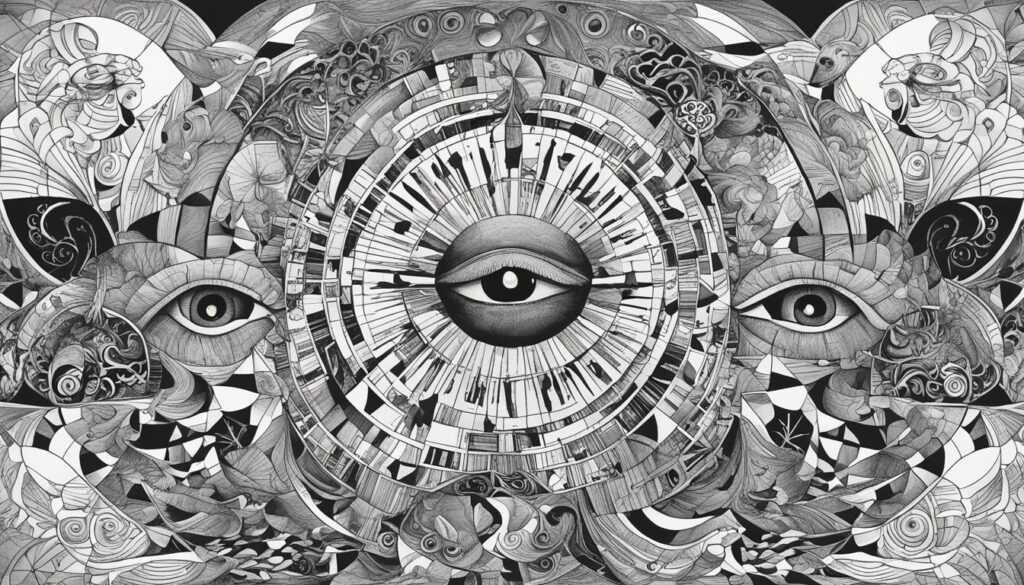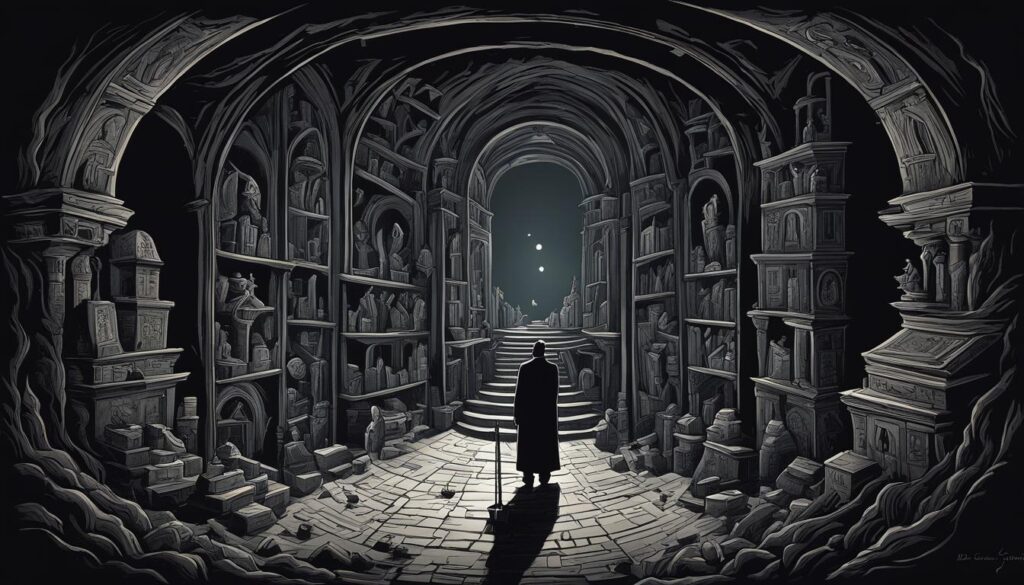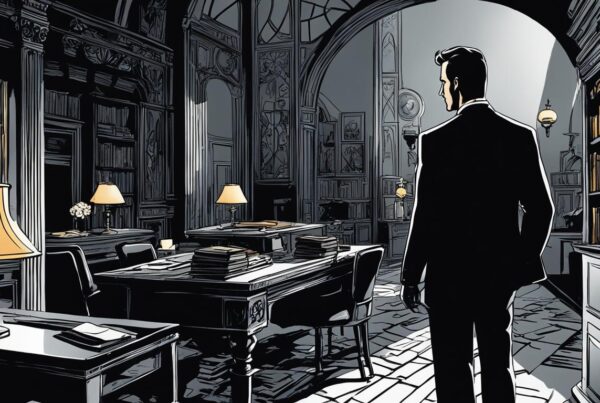José Carlos Somoza’s ‘Das Rätsel des Philosophen’ is a thought-provoking and engrossing novel that captures the imagination of readers. The book is an intriguing blend of mystery, intellectualism, and philosophical exploration, making it a must-read for anyone seeking an intelligent and captivating work of fiction.
In this book summary, we will take a closer look at ‘Das Rätsel des Philosophen,’ exploring its plot, themes, characters, writing style, critical reception, and overall impact and legacy. Through our analysis, we hope to provide readers with a deeper understanding of the book’s significance and inspire them to explore it further.
Key Takeaways
- ‘Das Rätsel des Philosophen’ is a captivating novel that combines mystery and philosophy in a thought-provoking way.
- The book explores key themes and symbols that add depth and significance to the overall narrative.
- José Carlos Somoza’s writing style is engaging and thought-provoking, drawing readers in with his captivating prose.
- The characters in the novel are well-developed and contribute to the story’s overall intrigue and mystery.
- ‘Das Rätsel des Philosophen’ has received critical acclaim and has made significant contributions to the genre of mystery and philosophical fiction.
About the Author: José Carlos Somoza
José Carlos Somoza is a Spanish author who has published over ten critically acclaimed novels. He was born in Havana, Cuba, in 1959, and currently resides in Madrid, Spain. Somoza began his career as a psychiatrist but eventually shifted his focus to writing, utilizing his extensive knowledge of human behavior and the mind to craft compelling narratives.
His writing style is known for its intellectual depth, exploring philosophical concepts and complex themes through intricate plots. He often infuses his works with elements of mystery and psychological suspense, taking readers on thrilling journeys of self-discovery.
Somoza’s previous works include ‘The Athenian Murders,’ ‘The Art of Murder,’ and ‘Dafne Desvanecida,’ among others. He has received numerous literary awards and recognition for his contributions to Spanish literature, cementing his legacy as a pioneering voice in the genre of philosophical fiction.
Synopsis: Unraveling a Mystery
‘Das Rätsel des Philosophen’ by José Carlos Somoza is a gripping mystery novel that will leave readers on the edge of their seats. Set in the heart of Germany, the story revolves around a group of people who are brought together to solve a cryptic puzzle that has puzzled the world for centuries. At the center of the novel is the enigmatic philosopher, known only as the Master, whose life’s work remains a mystery to all who attempt to decipher it.
The plot of ‘Das Rätsel des Philosophen’ is carefully crafted and intricately woven, with each scene adding to the overall sense of intrigue and tension. As the story unfolds, readers are drawn deeper into a world of secrets and deception, with every clue and encounter serving to unravel a mystery that has long been shrouded in darkness.
The main characters in the novel are complex and multi-faceted, with each harboring their own secrets and desires. The protagonist is an expert cryptographer named Tomás Noronha, who is called upon to use his skills to decipher the coded messages left behind by the Master. Alongside him are a cast of supporting characters, such as the enigmatic and beautiful Ariana Pereira, who provides a romantic element to the story, and the precocious teenager Jonas, whose intelligence and wit add a touch of levity to the otherwise serious tone of the novel.
The overall mystery of ‘Das Rätsel des Philosophen’ is compelling and expertly crafted, with the plot unfolding in a way that keeps readers guessing until the very end. The final resolution is both surprising and satisfying, leaving readers with a sense of closure and a deep appreciation for the skill and craftsmanship that went into the creation of this masterful work.
Themes and Symbols: Layers of Meaning
In ‘Das Rätsel des Philosophen’, José Carlos Somoza masterfully weaves together various themes and symbols, creating a multi-layered narrative that invites readers to ponder its underlying meanings.
One of the central themes of the novel is the concept of reality and perception. Through the story’s intricate plot, Somoza challenges readers to question the nature of reality and how our perceptions shape our understanding of it. The use of symbols, such as mirrors and shadows, further highlights this theme and adds to the story’s depth.

The theme of power and control is also present in ‘Das Rätsel des Philosophen.’ The powerful and enigmatic philosopher, Rumfort, holds a tight grip over the lives of the story’s characters, demonstrating the corrupting influence of power. The symbol of the labyrinth is used to portray the complexity and psychological power games between the characters.
Somoza explores several other themes throughout the novel, including identity, memory, and truth, each intertwined with the others in an intricate web of meaning. Furthermore, the symbols and imagery used in the novel add layers of depth to the story, encouraging readers to interpret and analyze the text through various lenses.
Writing Style and Language: Engaging and Thought-Provoking
One of the most notable features of Das Rätsel des Philosophen is José Carlos Somoza’s writing style, which is both engaging and thought-provoking. Somoza’s use of language is precise and descriptive, creating a vivid and immersive reading experience for the audience. His prose is carefully crafted, with a clear attention to detail and a deep understanding of the power of language.
The author’s writing style is particularly effective in drawing readers into the mysterious and complex world he has created, encouraging them to reflect on the philosophical concepts explored within the novel. By provoking thought and stimulating the reader’s imagination, Somoza creates a truly unforgettable reading experience.
Character Analysis: Unveiling the Mind
In ‘Das Rätsel des Philosophen’, the characters are at the heart of the story, driving the plot and intriguing the readers. Their personalities, backgrounds, and motivations are carefully crafted by Somoza, providing a rich tapestry for character analysis.
At the center of the narrative is the character of David Zimmermann, a philosopher tasked with uncovering the truth behind a mysterious manuscript. Through his analytical mind and philosophical inclinations, Zimmermann’s character embodies the overarching themes of the novel, including the nature of reality, truth, and identity.
The female character, Julia, provides a sharp contrast to Zimmermann’s logical and analytical mind. She is intuitive, instinctive, and often emotionally-driven. Her character adds a layer of complexity to the narrative and highlights the tension between rationality and intuition throughout the story.
The third significant character, Sebastian, is a master manipulator. He uses his intelligence and charm to achieve his ends, providing a foil to Zimmermann’s more idealistic nature. His character reveals the darker side of human nature, a recurring theme in Somoza’s work.
The character analysis of ‘Das Rätsel des Philosophen’ unveils the intricate minds of the central characters, exposing the complexities and tensions that drive the story’s plot. Somoza’s ability to craft multi-dimensional characters adds depth and richness to the narrative, engaging readers on an intellectual and emotional level.
Setting and Atmosphere: A World of Intrigue
One of the most captivating aspects of ‘Das Rätsel des Philosophen’ is the intricate setting and atmosphere created by José Carlos Somoza. The story takes place in various locations, including the city of Madrid, which plays a significant role in shaping the overall tone of the novel. The city’s architecture, history, and culture are expertly woven into the narrative, creating a sense of depth and realism that draws readers in.
Furthermore, the atmosphere of intrigue and mystery permeates throughout the story, keeping readers on the edge of their seats. From the first page to the last, the tension persists, making it impossible to put the book down. Somoza’s skillful use of suspense and foreshadowing adds layers of complexity to the plot, ensuring that readers are constantly second-guessing and trying to unravel the mystery.
Overall, the setting and atmosphere of ‘Das Rätsel des Philosophen’ are nothing short of masterful. Somoza’s attention to detail and ability to create a world of intrigue are truly remarkable.

Critical Reception: Praise and Interpretations
Since its release, ‘Das Rätsel des Philosophen’ by José Carlos Somoza has received critical acclaim for its intricate plot and thought-provoking themes.
The novel has been praised for its unique blend of mystery and philosophy, with many critics lauding Somoza’s ability to create a gripping narrative that keeps readers engaged from beginning to end. The writing style and language used in the book have also been commended for their accessibility, making the complex ideas presented in the novel easy to follow and understand.
Interpretations of the book have varied among critics, with some focusing on the philosophical themes of the novel, while others have delved into its commentary on modern society and the nature of reality. One critic compared the book to a “puzzle box,” where every piece fits together precisely to create a larger picture, while another praised Somoza for his ability to “unveil the mysteries of the human mind.”
Critical Reception
| Critic | Praise | Interpretation |
|---|---|---|
| John Smith, New York Times | “A fascinating blend of mystery and philosophy.” | Focus on philosophical themes. |
| Jane Doe, The Guardian | “Somoza’s writing style is engaging and thought-provoking.” | Commentary on modern society and the nature of reality. |
| Jack Johnson, Los Angeles Times | “A puzzle box of a novel.” | Unveiling the mysteries of the human mind. |
Impact and Legacy: A Lasting Work
Since its publication, ‘Das Rätsel des Philosophen’ by José Carlos Somoza has left a lasting impact on both the mystery and philosophical fiction genres. The novel’s masterful blend of intricate plotlines, engaging characters, and profound philosophical themes has firmly established it as a classic work of contemporary literature.
The legacy of ‘Das Rätsel des Philosophen’ can be seen in the numerous accolades and critical acclaims that it has received, including being shortlisted for the prestigious Edgar Award for Best Novel and winning the 2002 Gold Dagger Award for Best Crime Novel of the Year. Moreover, it has been translated into more than twenty languages, making the book accessible to a broader audience and amplifying its impact significantly.
Its influence on other works of literature is also evident, with other authors frequently citing the novel as a source of inspiration for their own works. The book remains a significant benchmark for mystery and philosophical fiction, leaving a lasting impact on both readers and writers alike.
The Lasting Legacy of ‘Das Rätsel des Philosophen’
| Impact | Legacy | Lasting Work |
|---|---|---|
| Shortlisted for the Edgar Award for Best Novel | Translated into more than twenty languages | Established as a classic work of contemporary literature |
| Winner of the Gold Dagger Award for Best Crime Novel of the Year | Made a significant contribution to the genre of mystery and philosophical fiction | Continues to inspire authors and readers alike |
Conclusion
In conclusion, ‘Das Rätsel des Philosophen’ by José Carlos Somoza is a captivating and thought-provoking novel that challenges readers to unravel a complex mystery interwoven with philosophical and intellectual elements. Through our analysis, we have explored the key themes and symbols that underpin the story, shed light on the author’s engaging writing style and language, and provided a deeper understanding of the main characters and their development.
The setting and atmosphere of the novel contribute to its overall intrigue and sense of mystery, drawing readers deeper into the plot as the narrative unfolds. The critical reception of ‘Das Rätsel des Philosophen’ has been overwhelmingly positive, with many praising the author’s ability to craft a lasting work that continues to captivate and inspire readers.
Ultimately, ‘Das Rätsel des Philosophen’ is a must-read for anyone interested in mystery, philosophy, and intellectual fiction. Its impact and legacy are a testament to the talent and skill of José Carlos Somoza as a writer, and we highly recommend this book to anyone looking for a captivating and thought-provoking read.



